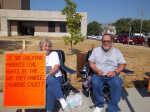Couple protests policies

Outfitted with colorful signs and lawn chairs, a LaCygne couple protested Kansas Social Rehabilitation Services' policies outside the Bourbon County Courthouse on Monday.
The agency, now known as the Department for Children and Families, differs with the stance the pair have taken.
Don and Phyllis Porter, who have been letting their feelings be known since 2006, allege the Department for Children and Families and its contractors make money off children.
"There's a lot of money in that," Don Porter said.
"We're just trying to make people aware of what they're doing to kids in the state of Kansas. The federal government gives the state so much money every year, and to get that money, you have to fill a quota," he said.
In a 2006 Tribune article, Don Porter said the agency had taken custody of his two daughters on and off for five to 10 years.
The couple protests alone or in groups all over the area. They have been to Iola, Pittsburg and several times to Topeka.
They are planning another trip next month.
"We've made a lot of people aware of it," Don Porter said.
Department for Children and Families Communications Director Angela de Rocha could not comment on the specifics of the Porters' case, but said the department does not remove children from homes, the courts determine of who gets custody of a child.
If a child is in immediate danger and police are called, the police can remove a child from a home. Normally, however, a report of child abuse is taken, DCF investigates and the courts determine custody.
DCF "does not make money on children" who come into custody. Child Protective Services is funded by the state's general fund, which comes from taxpayers. "It's a state expenditure," de Rocha said.
"Quite often courts make custody decisions that families disagree with," de Rocha said. The court could determine that an aunt is the best person to place a child with, or a foster home. In any case, she said, "we're talking about a child's life.
"Our first concern is the well-being of that child. All the determinations we make are in the context of that," she said.
